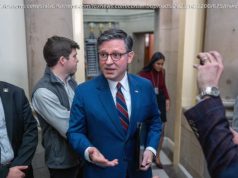A statement from a top North Korean official shows North Korea may not give up its nuclear weapons and could threaten the summit with President Donald Trump, and that Pyongyang really doesn’t like John Bolton.
North Korea may have undone months of diplomacy in only a few hours.
In a statement carried by the state-run Korean Central News Agency on Tuesday night, a top Pyongyang official criticized America’s insistence that North Korea completely dismantle its nuclear program and even warned that the regime might scuttle the upcoming summit between President Donald Trump and North Korean leader Kim Jong Un.
“If the US is trying to drive us into a corner to force our unilateral nuclear abandonment, we will no longer be interested in such dialogue and cannot but reconsider our proceeding to the DPRK-US summit,” said Kim Kye Gwan, a vice foreign minister, using the official acronym for North Korea.
The statement also got strangely personal: It singled out John Bolton, Trump’s national security adviser, for having said the US expects Pyongyang to give up all of its nuclear weapons. “We do not hide a feeling of repugnance towards him,” the vice minister said.
The statement came just hours after North Korea abruptly canceled a planned meeting with South Korea out of anger over joint US-South Korea military drills that started last week. Pyongyang routinely claims those exercises are practice for an eventual invasion of North Korea.
North Korea’s perceived about-face is a big deal. The planned June 12 Trump-Kim summit in Singapore would be the culmination of nearly six months of intense diplomacy between North Korea and the United States, along with China and South Korea. Those efforts temporarily reversed the path toward war both countries were on last year, and there were even signs Washington and Pyongyang would come to some agreement over North Korea’s nuclear program.
But now, even the Trump-Kim meeting is in jeopardy — which means Trump may lose the opportunity to strike a historic deal.
The Trump administration keeps saying it wants “complete, verifiable, and irreversible denuclearization,” meaning North Korea would dismantle its nuclear program altogether and allow experts to confirm it’s not hiding anything. In exchange, North Korea would receive financial incentives, most immediately in the form of sanctions relief.
But that’s a no-go for Pyongyang.
Experts believe Kim thinks nuclear weapons keep his regime safe. Part of that is because of what happened to Muammar Qaddafi, Libya’s former dictator. Qaddafi had a nuclear weapons program but in 2003 he made a deal to remove those weapons from his country in exchange for economic benefits.
Then in 2011, anti-Qaddafi rebels captured and killed him — with American help. Had he kept his nuclear weapons, it’s entirely possible the US would not have intervened during the country’s civil war and Qaddafi would not have met such an end.
“Kim Jong Un does not want to end up like Qaddafi, overthrown with Western military assistance after giving up his nuclear weapons program,” Kelsey Davenport, a nuclear expert at the Arms Control Association, told me.
In fact, the vice foreign minister explicitly referenced Libya in his statement on Tuesday, saying that North Korea is not Libya, which “met a miserable fate.”
All of this means that the US and North Korea remain in a stalemate over nuclear weapons heading into the summit.
“The fundamental challenge has not changed: The United States will not accept anything less than North Korea’s complete denuclearization, and Pyongyang will not willingly denuclearize,” Abraham Denmark, a former top Pentagon official focusing on Asia, told me.
“North Korea would probably agree to something less than full denuclearization,” Denmark said, “but it is unclear if the Trump administration will accept an agreement that falls short of its sky-high expectations.”
But last Sunday, Secretary of State Mike Pompeo signaled the US might accept a cap on North Korea’s missile program so that it can’t strike America. That’d be less than getting North Korea to denuclearize. So at this point, it’s not 100 percent clear what Trump may do if he meets with Kim.
Experts have continually cautioned that the Trump administration’s hardline stance toward North Korea might cause Pyongyang to bristle. And, well, it has.
“Hardline negotiating tactics, agreeing to do something and threatening to back out, refusing to denuclearize, rejecting a Libya-style deal, and hating on Bolton’s mustache — these are all things you could file under ‘shit that experts have been warning about for months,’” Van Jackson, a North Korea expert at the Victoria University of Wellington, told me while making a joke about Bolton’s facial hair.
This was somewhat predictable. North Korea has a history of making deals with the US over its nuclear program only to back out later on. In 1994, the US and North Korea signed the Agreed Framework, in which the North agreed to freeze its nuclear reactors in exchange for two nuclear power reactors and fuel oil from the United States. But the agreement collapsed in 2002, and by January 2003, the North had resumed its nuclear program.
And in 2009, Pyongyang walked out on talks with the US and four other countries to end its nuclear program, citing disagreements over technical details related to verification. Afterward, North Korea ramped up its nuclear and ballistic missile programs to the point that it now likely has a hydrogen bomb and a missile that could reach all of the United States.
So it’s not the Trump administration’s fault that North Korea is a mercurial and tough negotiating partner. But the administration’s hardline stance isn’t making things any easier.
“North Korea is not going to just give up a nuclear weapons program it spent the past 20-plus years creating for some hazy future economic relief,” Alexandra Bell, a nuclear expert at the Center for Arms Control and Non-Proliferation, told me.
Start
United States
USA — mix North Korea threatens to cancel Trump summit, reminds world it really loves...






